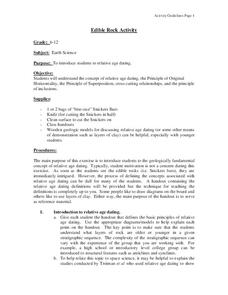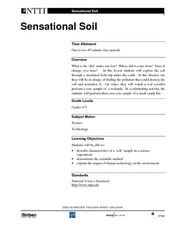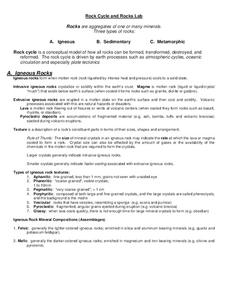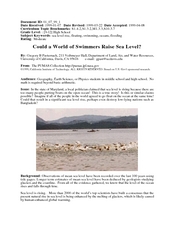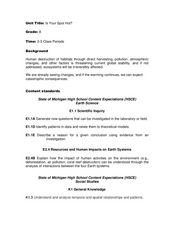Curated OER
From the Mouths of Space Scientists: An Introduction to Space and Weather
After researching the Greenland Space Science Symposium, curious thinkers create a PowerPoint or video presentation. They use the information they gathered to construct their presentation.
Curated OER
Bug Mountain Cake
How does your class celebrate Earth Day? If you are in need of a fun cooking activity that can fit into life science curriculum, look no further. Here is a quick and easy recipe for a bug mountain cake. It can be made in class and shared...
Curated OER
Edible Rock Activity
Who knew Snickers® could be used to teach science? Give your budding earth scientists a chance to explore the Law of Superposition, in addition to a well-earned snack.
Curated OER
Dirt Cups
After a hard day examining and dissecting worms, why not put your feet up and snack on a few? Here is a really cute idea that can be used to celebrate Earth Day or to accent a thematic learning experience. Kids use clay pots, gummy...
Curated OER
Vegetable Flowers with Homemade Ranch Dip
Vegetables aren't just things we can grow to eat; now they are things we can grow to create art! Use this cute and kid-friendly recipe during your next Earth Day celebration. It includes step-by-step instructions on how to turn...
Curated OER
Light Saver
Turn off the lights! That's right it's time to start thinking about conservation and saving electricity. Here is a very quick and very simple Earth Day craft that kids can do in a wink. They'll make light-bulb-shaped door hangers that...
Curated OER
Our Solar System and Seasons
Sixth graders investigate the relative diameters of planets and distances between them and the cause for seasons on Earth using the 5-E Learning Model. They appreciate the size and distances involved with objects in the real universe....
Curated OER
A Comparison of Cloud Coverage Over Africa
Students use a NASA satellite data to contrast amounts of cloud coverage over different climate regions in Africa. They explore how Earth's major air circulations affect global weather patterns, and relate to local weather patterns.
Centers for Ocean Sciences
Ocean and Great Lakes Literacy: Principle 1
Is your current lesson plan for salt and freshwater literacy leaving you high and dry? If so, dive into part one of a seven-part series that explores the physical features of Earth's salt and freshwater sources. Junior hydrologists...
Curated OER
Sensational Soil
Fourth and fifth graders explore soil by taking a simulated field trip under the earth. They go to an Internet site that runs a simulation which charges them with finding a source of pollution that could destroy all of Earth's soil, and...
Curated OER
Taking the Measure of the Universe
Four fabulous activities immerse amateur astronomers into measuring objects that we cannot handle. The experiences are applied to NASA's Space Interferometry Mission, which will take measurements of planets around stars other than our...
Safe Drinking Water Foundation
Water Bottles Everywhere
Young environmentalists examine how water bottle use is polluting the waters on our earth. In groups, your learners study the handout on their assigned topic and present their findings to the rest of the class. Leading up to this...
Curated OER
Sandwich Stratigraphy
Two activities are included in this resource. In the first, junior geologists model sedimentary rock layers, apply the Law of Superposition, and demonstrate folding and faulting of the Earth's crust. The model is technically a sandwich....
University of New Orleans
Rock Cycle and Rocks Lab
Science rocks! Explore three types of rocks and the rock cycle with an igneous rocks experiment. Pupils discuss textures, composition, and learn how melts are formed from the Earth's crust. They weigh materials using a scientific scale...
Curated OER
Oceanography Worksheet #1
If you are teaching physical oceanography to middle school earth scientists, here is a terrific multiple choice worksheet. Learners look at a diagram of a landscape created by glacial sediment deposition and the resulting ocean floor....
Space Awareness
Britannia Rule the Waves
Could you determine longitude based on measuring time? Early explorers used a longitude clock to do just that. Scholars learn about early exploration and the importance of the invention of the clock. Then pupils build their own longitude...
American Museum of Natural History
Volcanoes Magma Rising
Get ready for an explosive lesson! Learners read and interact with an online lesson describing the characteristics of volcanoes. They study specific historical volcanoes as well as the science of volcanic eruptions using animations and...
Alabama Learning Exchange
The Big Bang Theory: An Evidence-Based Argument
What evidence supports the big bang theory? Individuals analyze scholarly resources about the the theory and develop arguments backed by evidence. They brainstorm, share ideas, watch a video, and read articles to complete a graphic...
Curated OER
Mining and Land Reclamation - A Classroom Simulation
Students simulate mining mineral resources using cookies. In this earth science lesson, students analyze the cost and profits in mining. They write a lab report about the activity.
Curated OER
Could a World of Swimmers Raise Sea Level?
High schoolers determine the volume of water they displace. In this earth science lesson, students calculate the total water displaced by the world's population. They evaluate whether or not this value is enough to raise the sea level...
Curated OER
Round and Round-The Water Cycle
Students explore the water cycle. In this earth science activity, students work in small groups to read various books on the water cycle and take notes on chart paper. Students share their notes and teach a younger audience what they...
Curated OER
Finding Magnetic Fields of Earth
Fifth graders, in groups, create paper bag "globes", complete with magnetic poles. They use compasses to determine and label various locations (N. and S. Poles, Prime Meridian, Equator, etc.) and finish it by drawing in the continents...
Curated OER
Waterdrops Water Cycle
In this earth science activity, students read an article about the water cycle. Then they continue the story about the travels of a water droplet through time and space. Students also complete sentences by writing in the correct word...
Curated OER
Is Your Spot Hot?
Eighth graders explore global warming. In this Earth Science lesson plan, 8th graders will look for Harbingers and fingerprints for different areas. The students will identify an area at risk and they will then create a...


